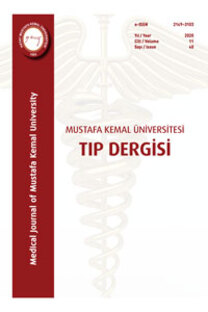ÇOCUKLARDA SUDA BOĞULMALARA GÜNCEL YAKLAŞIMLAR
Suda boğulma, kaza, suya batma
An Update On Drowning in Children
Drowning, accidents, immersion foot,
___
- 1- Gök Ş. [Asphyxias]. In: Gök Ş, ed. Adli Tıp. 5th ed. İstanbul: Filiz Bookstore; 1983. p.135-49.
- 2- Knight B. Immersion and drowning. Simpson’s Forensic Medicine. 10th ed. London: Edward Arnold; 1991. p.153-9.
- 3- Yorulmaz C, Çakalır C. [Drowning]. In: Soysal Z, Çakalır C, eds. Adli Tıp. Vol. I, İstanbul: İstanbul Üniversitesi Cerrahpaşa Tıp Fakültesi Yayınlarından Rek törlük No: 4165 Fakülte No.224; 1999. p.459-74.
- 4- Arslan M, Kar H, Akcan R, Çekin N. [Evaluation of diagnostic methods used in drowning]. The Bulletin of Le gal Me di ci ne 2005;10(1):29-34.
- 5- Bierens JJ, Knape JT, Gelissen HP, Drowming. Curr Opin Crit Care, 2002;8:578-586.
- 6- Golden FC, Tipton MJ, Scott RC. Immersion, Near-drowning and Drowning. Br J Anaesth, 1997;79:214-225.
- 7- Ballesteros MF, Schieber RA, Gilchrist J, Holmgreen P, Annest JL. Differential ranking of causes of fatal ver sus non-fatal injuries among US children. Inj Prev 2003;9(2):173-6.
- 8- Lakadamyalı H, Doğan T. [Investigation of drowning cases in a tourism region of Turkey]. Turkiye Klinikleri J Med Sci 2008;28(2):143-8.
- 9- Gordon I, Shapiro HA, Berson SD. Deaths usually initiated by hypoxic hypoxi a or anoxic anoxia. Forensic Medicine A Guide to Principles. 3rd ed. Edinburgh: Churchill Living stone; 1988. p. 115-27.
- 10-Fatteh A. The diagnosis of drowning. Hand book of Forensic Pathology. 1st ed. Philadelphia: JB Lippincott Company; 1973. p. 155-65.
- 11-Canturk N, Esiyok B, Ozkara E, Canturk G, Bulent Ozata A, Fatih Yavuz M. Medi colegal child deaths in Istanbul: data from the Morgue Department. Pediatr Int 2007;49(1):88-93.
- 12-Väli M, Lang K, Soonets R, Talumäe M, Grjibovski AM. Childhood deaths from external causes in Estonia, 2001-2005. BMC Public Health 2007;7:158.
- 13-Arslan MM, Çekin N, Hilal A, Kar H. [Investigation of drowning cases in Adana between years 1997-2006]. Turkiye Klinikleri J Foren Med 2008;5(1):13-8.
- 14-Somers GR, Chiasson DA, Smith CR. Pediatric drowning: a 20-year review of autopsi ed cases: Demographic features. Am J Forensic Med Pathol 2005;26(4):316-9.
- 15-Murray CJL, Lopez A. Mortality by cause for eight regions of the world: global burden of disease study. Lancet, 1997;349:1269-1276.
- 16-Numa AH, Hammer J, Newth CJL. Near-drowning and Drowning. In: Chernick V, Kendig EL, (eds). Kendig’s disorder of the respiratory tract in children. Philadelphia: W.B Saunders Company; 2006, 661-665.
- 17-Quan L, Cummings P. Characteristics of Drowning by Different Age Groups. Inj Prev, 2003;9:163-168.
- 18-Szpilman D. Near-drowning and Drowning Classification. A proposal to stratify mortality based on the analysis of 1831 cases. Chest, 1997; 112:660-665.
- 19-Torres SF, Rodríguez M, Iolster T, Siaba Serrate A, Cruz Iturrieta C, Martínez del Valle E, Schnitzler E, Roca Rivarola M. Near drowning in a pediatric population: epidemiology and prognosis. Arch Argent Pediatr 2009;107(3):234-40
- ISSN: 2149-3103
- Yayın Aralığı: 3
- Başlangıç: 2010
- Yayıncı: Hatay Mustafa Kemal Üniversitesi Tıp Fakültesi Dekanlığı
ÇOCUKLARDA SUDA BOĞULMALARA GÜNCEL YAKLAŞIMLAR
Vefik ARICA, Hüseyin DAĞ, Sibel KALÇIN, Sevilay KÖK, Kübra BÖLÜK, Murat DOĞAN
S. BAŞARSLAN, Cüneyt GÖÇMEZ, Kağan KAMAŞAK
VASO-OKLUSİV KRİZ ORAK HÜCRELİ ANEMİDE HEMATOLOJİK PARAMETRELERİ NASIL DEĞİŞTİRİR?
Can ACIPAYAM, Sadık KAYA, Gönül OKTAY, Gül İLHAN
